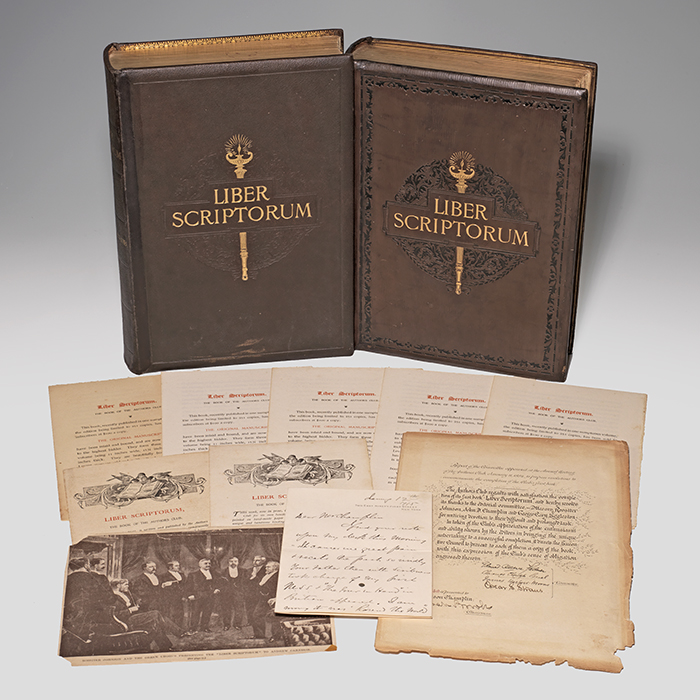
SIGNED BY MARK TWAIN, THEODORE ROOSEVELT, ANDREW CARNEGIE AND NUMEROUS OTHER AUTHORS: LIBER SCRIPTORUM, BOTH FIRST AND SECOND BOOKS, COMPLETE SERIES, WITH WONDERFUL PROVENANCE AND AN AUTOGRAPH LETTER SIGNED BY ANDREW CARNEGIE
(TWAIN, Mark, ROOSEVELT, Theodore, et al.). Liber Scriptorum. The First Book of the Authors Club. WITH: The Second Book of the Authors Club. New York: The Authors Club, 1893, 1921. Two volumes. Thick folio, publisher's full dark brown morocco, ornately blind- and gilt-tooled spines and boards, top edges gilt, uncut (Volume I) and publisher's gilt-stamped brown cloth, marbled endpapers, top edge gilt, uncut (Volume II). $18,000.
First editions, each one of only 251 numbered copies signed by each of the 213 contributors at their contribution, the most prominent being Mark Twain (“The Californian’s Tale,” first volume, page 161—the first appearance of this story), Theodore Roosevelt (“A Shot at a Bull Elk,” first volume, page 487) and Andrew Carnegie (“Genius Illustrated from Burns,” first volume, page 99). Also represented are William Dean Howells, Frank Stockton, Henry Van Dyke, Carl Van Doren and noted American publishers Henry Holt and George Haven Putnam. Volume I is the copy of John Denison Champlin, one of the editors of the first volume. With an autograph letter signed by Carnegie to Champlin's son expressing sympathy over the death of his father.
"The Authors Club of New York, organized in 1882, was a social club for like-minded men and a support group for younger writers. In 1891, club members conceived Liber Scriptorum as a means to raise money for a suitable permanent home. Each member contributed an original essay, story or poem that would never be published elsewhere. Each author signed 251 copies of his entry, and the books were then bound. The book, published and printed by club member Theodore Low De Vinne, sold for $100—almost $2000 in 2002 dollars. De Vinne donated the work at cost, and the club enjoyed a profit of $10,500. By the time the book was finished and the profit realized, Andrew Carnegie had given the club a suite of rooms in his building at 57th and Seventh Avenue, and the publication proceeds were used to furnish the rooms… With a sense of tradition, the Club planned a second book for the 25th anniversary of their premier effort, but World War I delayed publication until 1921. The second Liber Scriptorum appeared in the same format as the first, with prose articles and poems, all signed by their authors" (Carnegie Mellon University). Liber Scriptorum marks the first appearance in print of Twain's tale about an unfortunate man's undying devotion to his wife; contrary to the club's original plans, this story was later included in The $30,000 Bequest and Other Stories (1906). Other contributors include master printer Theodore Low De Vinne, William Dean Howells, Henry Van Dyke and Frank R. Stockton. Though "there are presumed to be 251 copies of the book; actually, over 30 of these were not bound but were sold as separate articles" (Johnson, 128). First volume number 249, second volume number 5. In Volume I, Percival Lowell has signed his contribution on a tipped-in slip, as have William Henry Bishop and William H. Pickering in Volume II; two other articles are unsigned, and a further nine are signed in facsimile. BAL 3438. Volume I was the copy of John Denison Champlin, one of the editors of the first volume. Laid into these volumes are a number of items related to their provenance: a printed leaf presenting the volume to John Denison Champlin, one of its three editors, "in token of the Club's appreciation of the enthusiasm and ability shown by the editors in bringing the unique undertaking to a successful conclusion"; five copies of the prospectus for the bound volumes of the original manuscript; a number of newspaper clippings, including an illustration of the first volume being presented to Andrew Carnegie; and an autograph letter signed by Andrew Carnegie. The Carnegie letter, on the stationery of his mansion on Central Park at 2 East 91st Street and dated January 12, 1915, reads in full: "Dear Mr. Champlin, I find your note upon my desk this morning—It causes me great pain to recall the past so vividly. Your father then with Scribners took charge of my first MSS and 'The Four in Hand' in Britain appeared. I am wrong it was 'Round the World' came first and Messrs. Scribners published a small Edition for private circulation, afterwards they asked me to permit them to publish for the public and your father had charge of it. So we go, all marching to the same end—no escape of no one can we say more decidedly than of your father. 'If there is another world he live in Bliss / 'If there be none he made the best of this. Pray convey to your dear Mother the profound sympathy of Mrs. Carnegie and myself. Long may you be disposed to guard over her for it is to the son the widowed Mother looks for all that can make life tolerable. Such was my own experience. Mother and son are one. With profound sympathy for both Sincerely yours Andrew Carnegie."
Interior fine, both volumes with expert repairs and restoration to joints, spine ends and board extremities.